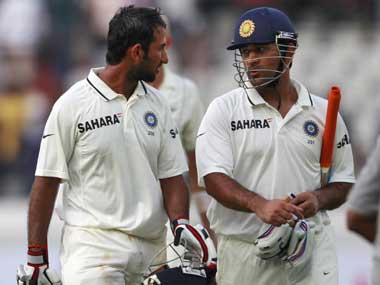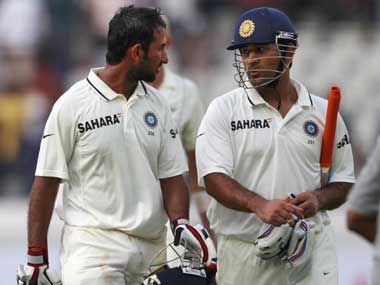Unpredictability. That is the essence of all expectation from sporting encounters. In individual events one expects even the weakest of players to spring a surprise on his more accomplished opponent. In the team games you expect a `match’, the subterranean faith being the presumed weaker side will rise to the occasion and deliver the knockout punch. That’s the reason fans invest so much trust in their players, in their teams and in sporting challenges. Without the expectation of the unpredictable, sporting contests make little sense. That is the reason the ongoing Test between India and New Zealand looks pointless from a cricket fan’s perspective. There are simply no surprises on offer. You know the guests are a weak side. [caption id=“attachment_430519” align=“alignleft” width=“380”]
 You know they cannot handle Indian spinners. You know Indian batting will easily dominate their bowling. AP[/caption] You know they cannot handle Indian spinners. You know Indian batting will easily dominate their bowling. And you know they don’t have enough to bat through two full innings or bowl India out twice. And you know they cannot stage a heroic fight back. As it is, watching Test matches on Indian pitches is always a painful experience. The real beauty of the game—the cricket ball performing a mesmerising dance in the air before rushing towards the stumps, fast bowlers barging in to deliver thunderbolts and batsmen hurrying on their feet artfully to negotiate the pace and movement—go missing on the patches of total baldness in the middle. Indian pitches simply kill the adrenaline flow in the avid cricket watcher. You don’t feel a cricket match with all its raw energy, you just watch a game, any game, being played out there in the middle. With speed and the thrill associated with it absent, cricket is generally a drab affair. Teams like New Zealand make the feeling of loss acute. It is not meant to be a condescending observation. India are not the best cricketing side in the universe by any stretch of imagination. Watching them turn lions at home always brings back the discomforting memories of their miserable performance in lively tracks of England and Australia. But on the dull sub-continental pitches too one expects a good competition. New Zealand does not have the wherewithal to be a strong competitor, particularly on Indian pitches. Imagine Cheteswar Pujara scoring his maiden ton in England or Australia or against South Africa off the Indian shores. It would automatically assume a different gravitas than his century at Hyderabad. Comparing him with Rahul Dravid at this stage and with these opponents is silly. Great players are made in tough situations, not on feather beds. Pujara simply has not had it tough so far. Yes, the purpose here is not to get into the Pujara-Dravid comparison but to put the blame squarely on Indian pitches and the insipid predictability they bring to the game. India plays at home till November 2013. This means the stage is set —should we call, fixed? —for it to stake claim for the Number 1 rank in Tests. We know by now that India is invincible at home. Even if it becomes the top team in the world, there would be niggling doubts about the true potential of the side. It could be argued that if when the other big teams flourish in home condition what is the big deal about India doing it on home ground? True. These teams have been far from impressive in India. But they perform better than India when they are not in sub-continental conditions. The problem with this contention is it emphasises too much on winning. It ignores the fact that cricket is about challenges too. There’s something awfully romantic about winning matches in hostile conditions. Great players and great matches are born out of these conditions, not docile, homemade ones. The series against New Zealand reveals the true cause why Test matches are losing fans, particularly in India. The game has become too predictable here, killing the thrill quotient significantly. That should be a strong case for having lively pitches in the country. If they want Tests to stay alive the authorities must bring back that expectation of unpredictability back to the game.
You know they cannot handle Indian spinners. You know Indian batting will easily dominate their bowling. AP[/caption] You know they cannot handle Indian spinners. You know Indian batting will easily dominate their bowling. And you know they don’t have enough to bat through two full innings or bowl India out twice. And you know they cannot stage a heroic fight back. As it is, watching Test matches on Indian pitches is always a painful experience. The real beauty of the game—the cricket ball performing a mesmerising dance in the air before rushing towards the stumps, fast bowlers barging in to deliver thunderbolts and batsmen hurrying on their feet artfully to negotiate the pace and movement—go missing on the patches of total baldness in the middle. Indian pitches simply kill the adrenaline flow in the avid cricket watcher. You don’t feel a cricket match with all its raw energy, you just watch a game, any game, being played out there in the middle. With speed and the thrill associated with it absent, cricket is generally a drab affair. Teams like New Zealand make the feeling of loss acute. It is not meant to be a condescending observation. India are not the best cricketing side in the universe by any stretch of imagination. Watching them turn lions at home always brings back the discomforting memories of their miserable performance in lively tracks of England and Australia. But on the dull sub-continental pitches too one expects a good competition. New Zealand does not have the wherewithal to be a strong competitor, particularly on Indian pitches. Imagine Cheteswar Pujara scoring his maiden ton in England or Australia or against South Africa off the Indian shores. It would automatically assume a different gravitas than his century at Hyderabad. Comparing him with Rahul Dravid at this stage and with these opponents is silly. Great players are made in tough situations, not on feather beds. Pujara simply has not had it tough so far. Yes, the purpose here is not to get into the Pujara-Dravid comparison but to put the blame squarely on Indian pitches and the insipid predictability they bring to the game. India plays at home till November 2013. This means the stage is set —should we call, fixed? —for it to stake claim for the Number 1 rank in Tests. We know by now that India is invincible at home. Even if it becomes the top team in the world, there would be niggling doubts about the true potential of the side. It could be argued that if when the other big teams flourish in home condition what is the big deal about India doing it on home ground? True. These teams have been far from impressive in India. But they perform better than India when they are not in sub-continental conditions. The problem with this contention is it emphasises too much on winning. It ignores the fact that cricket is about challenges too. There’s something awfully romantic about winning matches in hostile conditions. Great players and great matches are born out of these conditions, not docile, homemade ones. The series against New Zealand reveals the true cause why Test matches are losing fans, particularly in India. The game has become too predictable here, killing the thrill quotient significantly. That should be a strong case for having lively pitches in the country. If they want Tests to stay alive the authorities must bring back that expectation of unpredictability back to the game.
Cricket: This boredom is unbearable, bring back the thrill please
Akshaya Mishra
• August 25, 2012, 17:34:40 IST
Without the expectation of the unpredictable, sporting contests make little sense. Placid pitches are killing the audience expectation.
Advertisement
)
End of Article